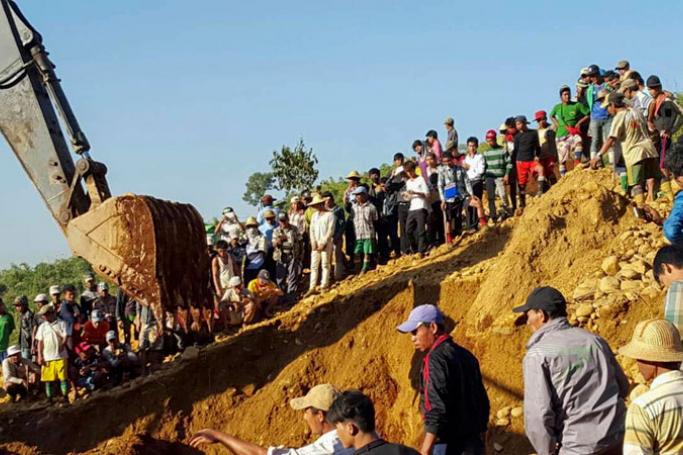Rescuers were searching for victims of a huge mine landslide in northern Myanmar Monday as the toll topped 100 in a disaster highlighting the perils of the country's secretive billion-dollar jade trade.
Authorities in the remote town of Hpakant, the epicentre of the world's production of highly valuable jade, have pulled scores of bodies from the earth since a huge mountain of debris collapsed onto dozens of flimsy shacks early on Saturday morning.
Those killed are thought to be mainly itinerant workers, who scratch a living picking through the piles of waste left by large-scale industrial mining firms in the hope of stumbling across a previously missed hunk of jade that will deliver them from poverty.
The landslide is thought to be the deadliest in recent memory in the hard to reach and impoverished area of northern Kachin state bordering China, with the official toll reaching 104 according to the Global New Light of Myanmar.
The state-backed newspaper said "many more people are still missing" after the accident, although authorities have said they did not know precisely how many people had been living in the area.
"The rescue operation is ongoing today and we are still collecting bodies. We have found more than a hundred," Dashi Naw Lawn, secretary of the Kachin Network Development Foundation, a community group involved in the rescue operation, told AFP.
- Stone of heaven -Myanmar is the source of virtually all of the world's finest jadeite, a near-translucent green stone that is enormously prized in neighbouring China, where it is known as the "stone of heaven".
But while mining firms -- many linked to the junta-era military elite -- are thought to be raking in huge sums, local people complain they are shut out from the bounty, instead facing abuses and frequent accidents.
The Hpakant landscape has been turned into a moonscape of environmental destruction as firms use ever-larger diggers to claw the precious stone from the ground, often dynamiting whole mountains.
In an October report, advocacy group Global Witness estimated that the value of Myanmar jade produced in 2014 alone was $31 billion and said the trade might be "biggest natural resource heist in modern history".
Official figures put sales of the precious stone last year at just $3.4 billion, with much of the best jade thought to be smuggled directly to China.
With little help from authorities, Hpakant community groups have pooled limited resources to help workers injured in the accidents which have become commonplace as the diggers creep closer to villages, sometimes gouging earth away from under homes.
The area is also plagued by rampant drug abuse, with heroin and methamphetamine easily and cheaply available on Hpakant's dusty streets, a side effect of Myanmar's massive narcotics trade.
Locals have launched desperate campaigns to try to persuade Myanmar's government to force mining firms to reduce their operations.
But their pleas have so far gone unheeded by Myanmar's quasi-civilian rulers, most of whom hailed from or boast links to the powerful military.
Aung San Suu Kyi's National League for Democracy swept landmark November 8 elections and will form a new government early next year.
But it has not yet outlined any firm plans for the jade trade beyond pledges for a more equitable allocation of profits from the country's natural resources.
NLD spokesman Win Htein told AFP that some party members were helping out with search and rescue operations at the site.
"It is our duty to help the country when we can. We have not ordered them to help, but they are doing what they should do," he said.
© AFP
You are viewing the old site.
Please update your bookmark to https://eng.mizzima.com.
Mizzima Weekly Magazine Issue...
14 December 2023
Spring Revolution Daily News f...
13 December 2023
New UK Burma sanctions welcome...
13 December 2023
Spring Revolution Daily News f...
12 December 2023
Spring Revolution Daily News f...
11 December 2023
Spring Revolution Daily News f...
08 December 2023
Spring Revolution Daily News f...
07 December 2023
Diaspora journalists increasin...
07 December 2023












